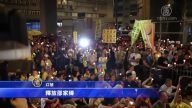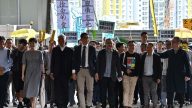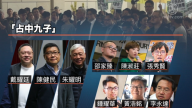【新唐人2014年10月11日訊】他是法律學者,卻站在「公民抗命」運動的中心;他是教授,卻支持學生罷課;他提出佔中,但卻是為了「不佔中」……這就是戴耀廷,一個似乎帶著些矛盾,但卻給香港打開了一把和平理性之傘,以抗衡專制風暴的人。今天,我們就來看看戴耀廷的矛盾,和他的堅持。
佔中發起人之一戴耀廷:「佔領中環正式啟動。佔領中環正式啟動。佔領中環正式啟動。」
9月28號凌晨,戴耀廷的這句話,啟動了港人「和平佔中運動」。就在當天,港府用胡椒噴霧、催淚彈,強硬壓制手無寸鐵的市民和學生,反而激發了更多市民走上街頭,撐起一把把雨傘來保護自己,同時也向港府和北京表達爭取真普選的決心。
今年50歲的戴耀廷,是香港大學法律系的副教授。1989年從港大法律系畢業後,戴耀廷曾經在李柱銘辦公室擔任法案助理,參與《香港基本法》起草。他是「基本法諮詢委員會」裡兩位學生代表之一,之後他又從英國倫敦大學捧回了法律碩士學位,回到香港教書,他研究的主題是神學、法律與宗教、人權、中國憲政與參與式民主。
其實,身為法律學者的戴耀廷,並不是不知道「公民抗命」意味著甚麼。
去年1月16號,戴耀廷在信報專欄寫下《公民抗命的最大殺傷力武器》,引起震撼。他在文中逐條分析對「和平佔中」的設想,其中包括一條「承擔罪責」。戴耀廷寫道:「公民抗命的行動屬違法行為……行動結束後,參與者應自行向執法部門自首。」
但是,也許正因為是法律學者,戴耀廷才這樣義無反顧。就像他在eetv「港人講事」專訪中所說──
戴耀廷:「我本身研究法治都有二十多年以上,在法治的理論當中,我們說的法治,不是守法這麼簡單。即使很多人覺得法治等於守法。但其實法治更高層次的理解,是法律必須要符合公義的要求。在現行的制度本身,是不符合公義的時候,歷史上我們可以看到很多人採取公民抗命的運動。」
而身為教師,戴耀廷也不是不明白,學生「罷課」意味著甚麼。當學生在政府總部前靜坐,遭到警察清場的時候,他也在那裡。
戴耀廷:「信息很明確,我們將和學生並肩作戰。我們將和你們一起,堅持到最後一分鐘。」
也許,正因為他把自己定義為教師,才希望越來越多的香港人,能夠加入這個「街頭民主大學堂」。就像他和另兩位佔中發起人在《和平佔中信念書》裡所說:把民主普選、公平公義這些普世價值傳揚給香港人,並希望他們願意為了在香港的制度和社會落實這些價值而付出代價。
戴耀廷:「我們一定,一定,要對全世界非常清晰的聲明:佔中不是顏色革命。這只是香港人爭取民主的一個運動,為了有自己的權利,平等的權利,這是香港人應該享有的。」
和平佔中運動獲得全球支持,但質疑、壓力也一波接一波。面對這些,戴耀廷並不是無動於衷。
對於香港市民,他多次表示歉意,請求他們體諒佔領行動造成的不便。但對於港府,他則是針鋒相對。
戴耀廷:「我們會繼續,一直繼續。我們要記住人們為甚麼走上街頭,並不是因為學聯,學民思潮,或是佔中的召集,而是因為催淚彈,因為政府不願回應港人的普選訴求,所以人們才走出來。這就是我們的要求,這個問題只有政府才能解決。」
如今,佔中已經成為97年香港回歸以後,北京面臨的最大抗議。不過,戴耀廷卻說,他重視的並不是對抗。他在接受台灣《天下》雜誌專訪時說:「佔中是為了不佔中,就是要透過對抗產生一種張力,佔中是未來的緊張,讓大家回到談判裡。」他說,重視的是民主的商討,透過討論的過程,希望找到解決紛爭的方法。
但是,由於港府單方面宣佈擱置對話,學界呼籲堅守街頭,佔中運動還將持續下去。而戴耀廷所希望看到的,港人追求民主的意識,也將通過一把把撐開的雨傘,繼續在香港街頭,形成追求民主的風景線。
編輯/尚燕 剪輯/黎安安
Benny Tai: Occupy Central Is to Not Occupy Central
He is a law scholar standing in the center of a civil disobedience movement. He is a professor supporting the student strike.
He proposed Occupy Central so that the Central “is not occupied." He is Benny Tai, a seemingly contradictory figure who opened an umbrella of peace and rational to fight a storm in Hong Kong.
Today, let’s take a look at Benny Tai and his contradictions and insistence.
Benny Tai: “Occupy Central has officially launched. Occupy Central is officially launched. Occupy Central is officially launched."
On the morning of Sept. 28, Benny Tai initiated Occupy Central in Hong Kong with love and peace. On the same day, the Government’s tough repression of unarmed citizens and students with pepper spray and tear gas has motivated more protesters.
They hold up umbrellas to protect themselves and to demonstrate to the Government and Beijing their determination to fight for true universal suffrage.
The 50-year-old Benny Tai is an associate professor of Law at the University of Hong Kong. After graduating from Faculty of Law, University of Hong Kong, he has served as an assistant in legislator Martin Lee’s office, participating in the draft of Hong Kong Basic Law. He was one of the two student representatives in the Consultative Committee for the Basic Law. He received his master’s degree in law from London School of Economics and Political Science and specializes
in constitutional law, administrative law, law and governance, law and politics as well as law and religion.
In fact, as a law faculty member, Benny Tai is aware of the meaning of civil disobedience.
Last Jan. 16, Benny Tai published a stirring article in the Hong Kong Economic Journal entitled, “The Largest Mass Destruction Weapon of Civil Disobedience." He analyzed and listed the possible plan and consequences for Occupy Central, which included being held accountable. He stated, “Civil disobedience is illegal…after the movement, participants should surrender themselves to law enforcement."
However, perhaps his legal scholar identity has Benny Tai make the decisive move like what he had pointed out in the interview with EETV program, SpeakOut.
Benny Tai: “I have studied the rule of law for more than twenty years. In theory, the rule of law is not as simple as law-abiding; many people even think that way. But in fact, a higher level of understanding of the rule of law is that the law must meet the requirements of justicein the existing system itself.
When the current system itself is not consistent with justice, we can see in history that many people began civil disobedience movements."
As a faculty member, Benny Tai understands what the student strike means. He was present when students who were holding sit-ins in front of government headquarters were cleared by police.
Benny Tai: “Well, I think the message is very simple. We will stand with you (student protesters) together. And we will stay here till the last minute with you together."
Perhaps his teacher identity has given him hope that increasingly more Hong Kong people will join this street democracy.
As he and two other Occupy Central promoters have said in the official release on the Occupy Central, “Spread the universal values of democratic universal suffrage, fairness and justice to the people of Hong Kong, and hope that they are willing to pay the price to implement these values in the institution and community in Hong Kong."
Benny Tai: “We must, we must, state it very clearly to the whole world: this is not a color revolution. This is only a movement of Hong Kong people to strive for democracy to get their rights, equal rights, which should be enjoyed by the Hong Kong people."
Occupy Central has won global support, as well as waves of questions and pressure. Faced with these, Benny Tai is not indifferent.
To Hong Kong people, he repeatedly apologized, asking them to understand the inconvenience caused by the occupation. But to the Government, he is tit for tat.
Benny Tai: “We will continue, will continue. Again remember what has caused the people to come out. It’s not out of a call from the federation of students, Scholarism or Occupy Central. It’s because of the tear gas. It’s because of the government failing to respond to the demands of the people, for the universal suffrage and the people out there.
That’s the demands and that is something only the government can deliver."
Today, Occupy Central has become the biggest protest Beijing faces since reunification of Hong Kong in 1997. However, Benny Tai said his emphasis is not confrontation.
In an interview with Taiwan’s Common Wealth Magazine, he said, “Occupy Central is so as to not occupy the Central. It is to develop a tension through confrontation, and Occupy Central is the future tense so that we return to negotiating." He said the focus is democratic discussions in hopes of finding solutions to disputes.
However, since the Government unilaterally announced the shelving of dialogue, academia appeal to stick to the streets and Occupy Central will continue.
What Benny Tai would like to see and the democracy Hong Kong people are pursuing will continue to become the landscape in Hong Kong through each open umbrella in the streets.
Edit/ShangYan Post-production/Li An’an






















